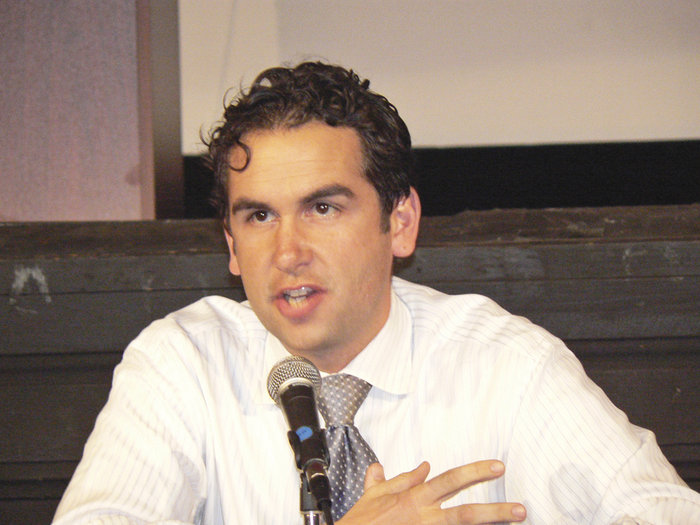A 27-year-old man named Deon, interviewed last week while he was hanging out on Ocean Avenue, said he has never heard of City Council members Steven Fulop and Diane Coleman. He has never voted and won’t be voting for Fulop or Coleman when the former runs for mayor and the latter runs to retain her council seat in Ward F this May. Still, Deon, an admitted small-time former drug dealer, will be the focus of a major city initiative if the two win their upcoming elections.
On Friday, Fulop, Coleman, and Rev. Joyce Waterman – who is running for a council at-large seat on the Fulop slate – released preliminary plans for a Jersey City Reentry Initiative for ex-offenders like Deon.
The 33-page proposal, released Feb. 15 at a press conference in Ward F, outlines Fulop’s plan to reconnect people coming home from prison with mental health counseling, job training, employment, housing, substance abuse counseling, and other resources in an effort to lower recidivism among ex-offenders in Jersey City.
While such an initiative may mean little to Fulop’s “core” supporters in his home base of Ward E near the waterfront, the issue of prisoner reentry is a major one for many African American voters, particularly in Ward F, where large percentages of young men like Deon have prison records. These records often prevent men like him from obtaining legal employment, bar them from educational and training programs, and prevent them from supporting themselves and a family.
The issue of prisoner reentry is a major one for many African American voters where large percentages of young men have prison records.
____________
Early last week Coleman found herself embroiled in controversy after she remarked at the City Council caucus meeting that “no one in Ward F” would be able to qualify for a job training program for Newark Airport, because they have criminal records. The federally funded training program in question requires that applicants have a high school diploma, 10 years of verifiable work history, and no record.
At the City Council meeting, resident Steven Pinkney praised Coleman for shedding light on a hard truth. Other residents, including Hudson County Freeholder Jeff Dublin and activist Arnold B. Williams, were more critical of Coleman’s comments.
“The League of Black and Latino Voters demand an immediate open public apology to the residents of Ward F and the people of Jersey City for your ignorant and disparaging remarks toward African American people,” Williams said in an open letter to Coleman.
Jersey City Reentry Initiative
Regardless, the problem of finding jobs for people with criminal records is a major concern for many residents in Ward F, and Fulop’s ability to address the issue could determine his level of support in this part of the city.
Fulop thinks there can be broad support for this initiative, even beyond d Ward F.
“I think there is support for this sort of program, as long as you are thinking about the non-offenders as well and clearly in our plan we have done that,” said Fulop. “It is a multifaceted approach. As of today, I am the only candidate to put forward any detailed initiatives, which I am very proud of.”
Thus, the “Jersey City Reentry Initiative” is the second in a series of white papers the Fulop campaign has released.
The first white paper, released three weeks ago, dealt with crime and public safety.
The initiative gives an overview of existing state and federal programs that offer some scattered resources for people coming out of the criminal justice system. These resources include tax credits for employers that hire ex-offenders, bonding resources, and federal grants.
The paper also looks at other cities – namely New Haven, CT, Baltimore, MD, Denver, CO, and Newark – to see what they are doing to re-engage their ex-offenders back into the community.
For Jersey City, Fulop is proposing a better coordination of existing services and the hiring of a case manager to work with the law enforcement community (i.e., parole officers) and the social service community to develop what he is calling a “business plan” to work with this population.
The city’s Reentry Initiative would be guided, in part, by an advisory board made of activists, law enforcement, members of the business community, and government officials.
Fulop expects this initiative to get up and running within a year and will require about 200,000 to 300,000 in start-up funds. The eventual target budget could be between $500,000 and $600,000.
When asked how the city will pay for this initiative, Fulop said, “Newark has done this entirely with entirely grants, as there is a ton out there in support of this, as it has a lasting impact on the community. [Also], I think there is plenty of redundancy in city government that I can get to this [$500,000 to $600,000] number over five years between grants and money from the city through savings.”
Fulop’s plans for ex-offenders are part of a larger economic development and jobs plan he wants to implement, if elected mayor. For example, he said the city’s tax abatement structure would be “overhauled,” and he would re-introduce legislation requiring a percentage of Jersey City residents or Jersey City-based contractors to be employed on construction jobs financed by the city’s Affordable Housing Trust Fund.
“Whenever resident tax dollars are used to assist a private developer in a project, residents should see additional benefits, such as jobs,” said Fulop.
The Healy campaign did not have a comment on Fulop’s proposal by press time Friday.
E-mail E. Assata Wright at awright@hudsonreporter.com.
